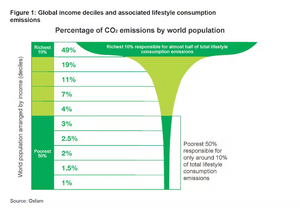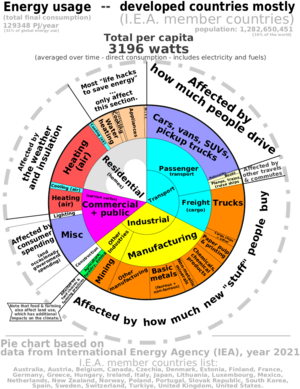Frugalism: Difference between revisions
No edit summary |
|||
| Line 1: | Line 1: | ||
[[File:carbon-inequality1.png|thumb|This page tells people to '''consume less stuff'''. Note that this is directed at people in '''"developed"''' countries, especially people who are middle-class or richer (i.e. the 20% of the world that uses 80% of resources). We are '''not''' telling poor people to consume less.]] | [[File:carbon-inequality1.png|thumb|This page tells people to '''consume less stuff'''. Note that this is directed at people in '''"developed"''' countries, especially people who are middle-class or richer (i.e. the 20% of the world that uses 80% of resources). We are '''not''' telling poor people to consume less.]] | ||
'''More than a third''' of all [[energy]] usage is affected by '''what people buy, and how much of it.''' | '''More than a third''' of all [[energy]] usage is affected by '''what people buy, and how much of it.''' | ||
In this sense, we '''can''' save the planet by being '''cheap''' | In this sense, we '''can''' save the planet by being '''cheap.''' __NOTOC__ <!-- I hid the table of contents here to help maintain readers' visual attention. --> | ||
===We can still have nice things, just not replace them ''as'' often.=== | ===We can still have nice things, just not replace them ''as'' often.=== | ||
| Line 57: | Line 53: | ||
==See also== | ==See also== | ||
[[File:energy-usage-affected-by.png|thumb|Pie showing how much of [[energy]] usage is affected by the production/consumption of goods.{{minor|<br />See also: [[Why energy usage serves as a good general estimate of carbon emissions]].}}]] | |||
* [[Planned obsolescence]] | * [[Planned obsolescence]] | ||
* [[Code bloat]] | * [[Code bloat]] | ||
* [[Right to repair]] | * [[Right to repair]] | ||
Latest revision as of 08:51, 16 October 2023

More than a third of all energy usage is affected by what people buy, and how much of it.
In this sense, we can save the planet by being cheap.
We can still have nice things, just not replace them as often.
If you take a walk in a middle-class neighborhood on garbage day, you'll see the type of perfectly-good stuff people throw out.
Examples
This section has not been filled in yet.
Analysis needed for this section: Consider various types of consumer goods, such as clothing, electronics, kitchenware, furniture etc. For each good, consider how long it could last. Then compare with the status quo of how often people actually replace it. Using the ratio between the two stats, we can calculate what percent of environmental impacts could be avoided if people chose to replace stuff less often.
Tips
This section has not been filled in yet.
See also

See also: Why energy usage serves as a good general estimate of carbon emissions.